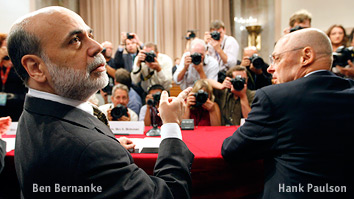Carping about the TARP
對救援計劃吹毛求疵
Congress wrangles over how best to avoid financial Armageddon
美國國會爭論如何最大程度地避免金融災難

IF ONLY, America’s financial authorities must feel, they could gag congressmen as easily as they have muzzled short-sellers. Financial markets around the world were choppy this week as Republicans and Democrats wrangled over the $700 billion rescue plan for Wall Street proposed last week by Hank Paulson, America's treasury secretary.
美國金融監管者肯定感覺到,如果他們能像讓賣空者閉嘴那樣容易就能堵住國會議員們的嘴該多好呀!美國財長保爾森上周向國會提交了一份7000億美元的華爾街救援計劃。本周的世界金融市場隨著美國共和民主兩黨對此提案的爭論不休而起伏動蕩。
One fear is that Mr Paulson’s troubled asset relief programme (TARP) will be blocked on Capitol Hill. That is possibly overdone: the risk of being blamed for plunging the world’s greatest economy into financial ruin is a good incentive for all sides to reach a compromise. Of more concern is that the plan, if it were approved, would neither shore up the financial system nor save the American economy. On that point there is room for argument, and hence for more uncertainty in the markets.
其中一個擔心便是保爾森的問題資產救援計劃會在國會山受阻。這也許有些夸張了:因為承擔將世界最大經濟體拖入金融廢墟責任的風險顯然會使兩黨達成妥協。另一個更大的擔心是,即是這項計劃被通過,如果它不能支撐美國金融體系并保住美國經濟怎么辦。從這個角度來說的話,救援計劃中的項目還有值得討論的地方。因此,市場還會有更多的不確定性。
Mr Paulson’s plan is to use public money to buy assets from banks whose value has slumped with every lurch downwards in America’s housing market and which have been shunned by the private sector. With a floor put under the value of those instruments it should be easier for banks to raise capital. Without capital, and amid relentless write-downs on those toxic assets, banks would have to curtail lending, causing a massive credit drought in America. That would not only further batter the housing market. It might also push companies into bankruptcy, too, causing mayhem in the $62 trillion market for credit derivatives.
保爾森的計劃是使用公共資金來購買銀行的不良資產。這些資產由于美國房地產市場的大幅下跌而嚴重縮水,私人資本對此也無人問津。由于救援計劃給了這些票據 一個最低保障價值,銀行就更容易籌得資金。如果沒有資金,而且處于殘酷的不良資產減記的情況下,銀行便會減少貸款,從而使美國陷入全面的嚴重的信貸干涸 期。這不僅會更加打擊房地產市場,而且還會將公司逼向倒閉,給62萬億美元的衍生品市場的帶來嚴重沖擊。
“Despite the efforts of the Federal Reserve, the Treasury and other agencies, global financial markets remain under extraordinary stress,” Ben Bernanke, chairman of the Federal Reserve, said in prepared remarks for a hearing of the Senate Banking Committee on Tuesday September 23rd. “Action by Congress is urgently required to stabilise the situation and avert what otherwise could be very serious consequences for our financial markets and for our economy.”
“盡管美聯儲,財政部和其他機構都在努力,世界金融市場依然處于非常巨大的壓力之下,”美聯儲主席伯南克在周二(9月23日)參議院銀行委員會的聽證會上如是說,“迫切需要國會采取行動來穩定局面,并保護金融市場和美國經濟免遭嚴重后果。”
Few dispute the potential threat; the demise of a 75-year-old investment-banking model on Wall Street in just a few days shows the financial system to be vulnerable. But there is plenty for everyone to dislike about aspects of Mr Paulson’s plan. It could safeguard irresponsible bankers’ jobs, while doing little to stop troubled mortgage debtors from being thrown out of their homes. It seeks to invest massive power in a treasury secretary with a lifelong loyalty to Wall Street. The banks with the worst assets (ie, those which have made the worst decisions) could receive the most help. Most disturbing, the taxpayer will be funding an enormous, ill-defined programme, without any stipulation as yet that the banks who orchestrated the mess will pay a penalty.
幾乎沒人對潛在的威脅產生質疑。華爾街上有75年歷史的投資銀行模式在幾天內的迅速死亡顯示了金融體系的脆弱不堪。但是對每個人來說,保爾森計劃都有不招 人喜歡的地方。這個計劃會保住不負責任銀行家的工作,但是對于即將趕出家門的,陷入困境的抵押貸款者卻沒啥幫助。這項計劃試圖將巨大的權力賦予一個畢生都 對華爾街忠誠的財政部長。那些擁有最糟糕資產的銀行(即是做過最差決策的銀行)會得到最大的幫助。最令人煩惱的是,納稅人的錢會來支援一個巨大的,不明朗 的計劃,而且沒有任何約束規定,就像到目前為止對于造成這場危機的銀行沒有任何處罰一樣











